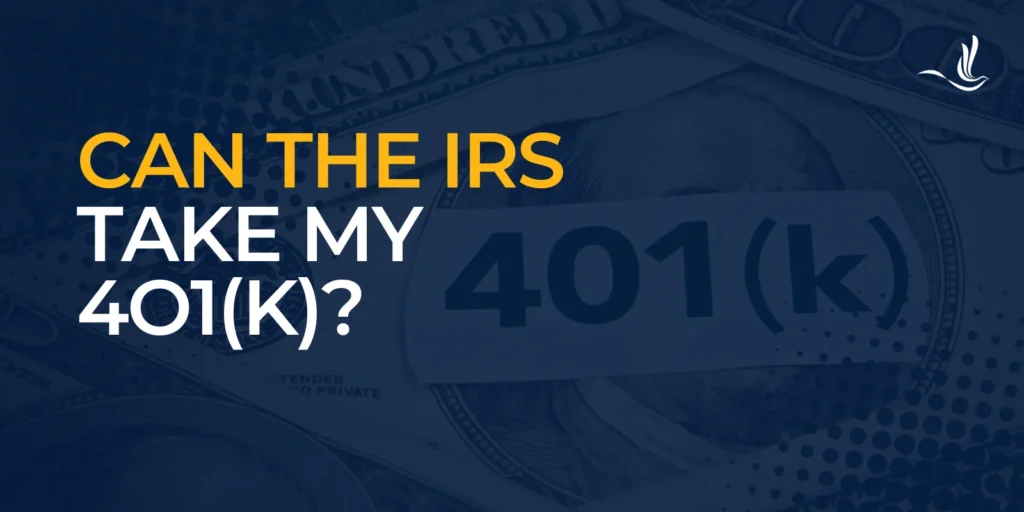Owing back taxes is a stressful situation for many Americans. Therefore, understanding the potential consequences is crucial. One common concern is whether the IRS can seize your 401(k) retirement savings to satisfy unpaid tax liabilities. Here’s what you need to know about if the IRS can take your 401(k).
Understanding the IRS’s Authority
The IRS has broad powers to collect unpaid taxes, including levying your wages, bank accounts, and other financial assets. However, their ability to reach into retirement accounts like a 401(k) has some specific limitations and conditions.
Can the IRS Seize Your 401(k)?
Yes, the IRS can levy your 401(k) if you owe back taxes, but it is generally considered a last resort. Here’s how the IRS collections process works.
- Exhaustion of Other Options: The IRS typically explores other avenues for collecting owed taxes before targeting retirement accounts. They might first levy your bank accounts, garnish wages, or place liens on your property.
- Due Process: Before the IRS can levy your 401(k), they must provide you with due process, which includes sending you a Notice of Intent to Levy and a Notice of Your Right to a Hearing. This gives you the opportunity to settle the debt, enter into a payment plan, or contest the levy.
- Qualified Plans: 401(k) accounts are qualified retirement plans under ERISA (Employee Retirement Income Security Act), which offers some protections. However, these protections are not absolute against federal tax levies.
How the Levy Process Works
If the IRS decides to proceed with a levy on your 401(k), the process generally involves:
- Notice and Hearing: You receive a final notice of intent to levy and a chance to request a hearing. This typically gives you 30 days to act before they proceed with the seizure.
- Approval and Execution: If no resolution is reached, the IRS may issue a levy to the administrator of your 401(k) plan.
- Distribution and Penalties: Once the levy is executed, the plan administrator will liquidate the necessary assets in your 401(k) to pay the IRS. This can trigger early withdrawal penalties and income taxes on the distributed amount, further reducing your retirement savings.
Potential Defenses and Resolutions
Before the IRS resorts to levying your 401(k), you have several opportunities to address the debt. For example, you can set up an installment agreement with the IRS. This can prevent them from taking drastic measures like seizing your retirement accounts. You can also submit an Offer in Compromise. This allows you to negotiate a settlement for less than the full amount owed if you meet certain criteria. Another option is to receive Currently Not Collectible (CNC) status. If you can prove that paying the tax debt would cause significant financial hardship, the IRS might temporarily halt collection efforts. A last resort and less common option is to file for bankruptcy. In some cases, filing for bankruptcy can discharge certain tax debts, although this is a complex and significant decision.
Protecting Your 401(k)
To protect your 401(k) and other assets, it’s essential to address tax issues promptly. Stay current and always file your tax returns on time. Do this even if you can’t pay the full amount owed. This minimizes penalties and interest. Remember, the failure to file penalty is more intense than the failure to pay penalty. Be sure to seek professional help if you need it. Consulting with a tax professional or attorney can provide tailored advice and negotiation strategies.
Tax Help for Those Who Owe Back Taxes
While the IRS does have the authority to levy your 401(k) for unpaid taxes, it’s a measure typically reserved for when other collection efforts have failed. Understanding the process and your rights can help you navigate this challenging situation. By proactively addressing tax debts and seeking professional advice, you can protect your retirement savings and work towards resolving your tax obligations. If you find yourself in a situation where the IRS is threatening to levy your 401(k), it’s crucial to act quickly and seek professional assistance to explore all available options and mitigate the impact on your financial future. Optima Tax Relief is the nation’s leading tax resolution firm with over $3 billion in resolved tax liabilities.
If You Need Tax Help, Contact Us Today for a Free Consultation
Publisher: Source link











